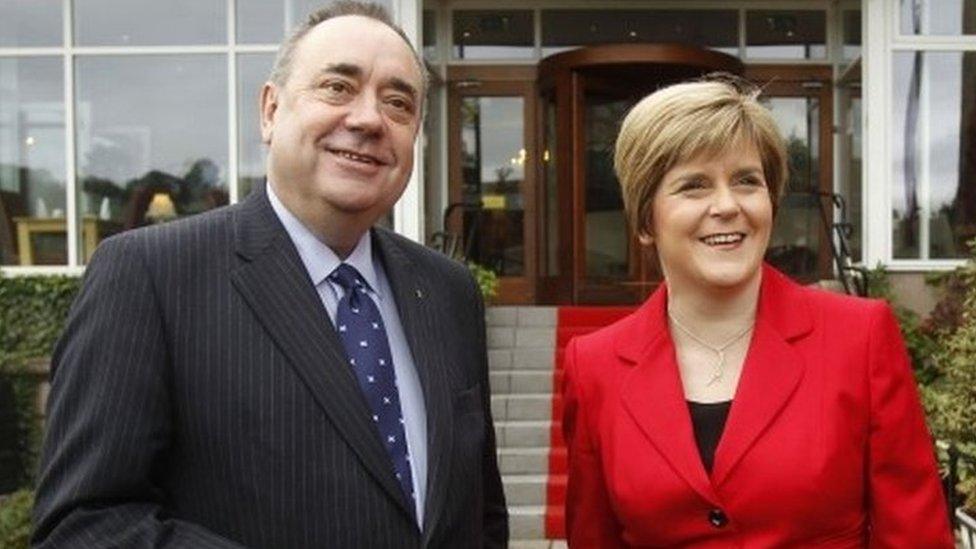Did Nicola Sturgeon break the ministerial code?
- Published
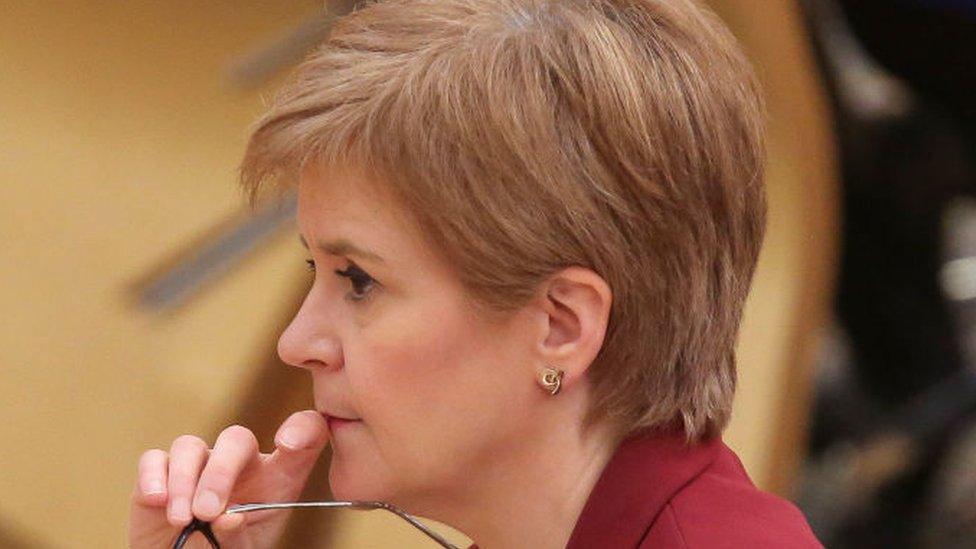
Nicola Sturgeon referred herself for an independent investigation of whether she breached the code in January 2019
Scotland's First Minister Nicola Sturgeon is facing questions after her predecessor Alex Salmond accused her of "repeatedly" misleading parliament and breaking the ministerial code.
Ms Sturgeon has rejected the accusations, but has referred herself for an independent investigation. What exactly are the claims, who will adjudicate and what could it all mean?

What is this all about?
The row centres on the Scottish government's botched investigation of harassment complaints against Mr Salmond, something which has now been subject to a wide range of inquiries.
A special Holyrood committee has been looking into the circumstances which saw the government admit its probe had been "unlawful" and pay Mr Salmond more than £500,000 in legal costs.
Questions have been raised about the role of Ms Sturgeon, and her contact with Mr Salmond during the investigation in 2018 - questions which prompted her to refer herself to an independent panel which adjudicates on the ministerial code.
There has always been a code of conduct for Scottish ministers, external, setting out expected behaviours and responsibilities, but it was Mr Salmond who introduced the panel in 2008. He was investigated and cleared of breaching the code on five occasions.
Suggestions that Ms Sturgeon might have broken the rules came to the fore thanks to Mr Salmond, who claimed his successor in Bute House had "repeatedly misled" parliament and made "wholly false" statements.
Ms Sturgeon has insisted she has "nothing to hide", did not mislead parliament, and will set out her side of the story to both inquiries in the coming weeks.
Mr Salmond may get to put his side across first, having been invited to give evidence to the Holyrood committee next week.
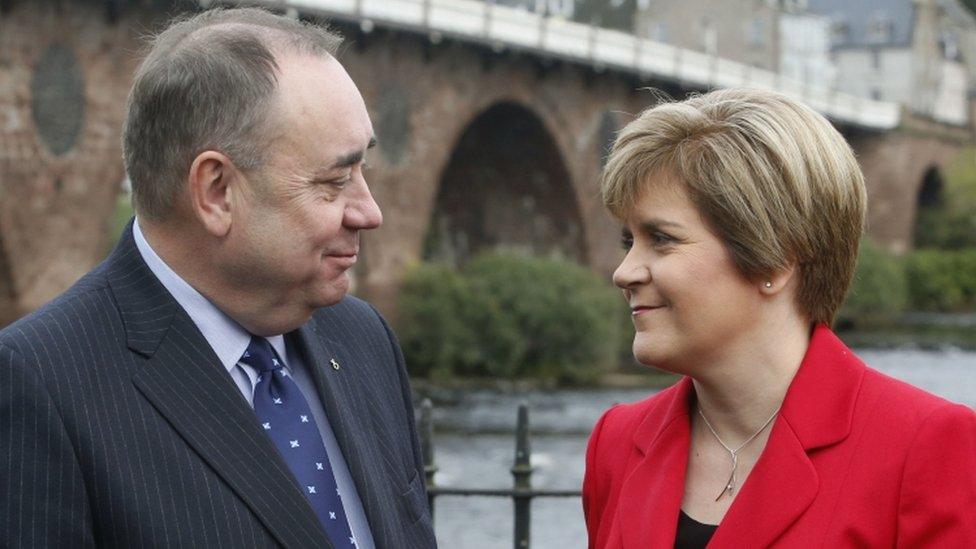
Ms Sturgeon says she has not spoken to her former mentor since their last meeting in 2018
Who knew what - and when?
One central question is when Ms Sturgeon learned of the two internal complaints against her predecessor.
The first minister has said on a number of occasions that she first heard about them from Mr Salmond himself, at a meeting at her Glasgow home on 2 April, 2018.
She has since accepted that she met Mr Salmond's former chief of staff Geoff Aberdein at her office four days earlier, on 29 March, but had "forgotten" about it.
Ms Sturgeon still maintains that she learned of the fact and detail of the complaints from Mr Salmond himself - an encounter which she says was "seared on my memory" and had "somehow overwritten in my mind a much more fleeting, opportunistic meeting that took place a few days earlier".
However, Mr Salmond says this claim is "simply untrue" and "untenable".
He says Mr Aberdein's evidence is that he "personally discussed the existence of the complaints and summarised the substance of the complaints" in a "pre-arranged meeting" on 29 March - and had shared this information with Mr Salmond and others at the time.
Section 1.3 of the ministerial code states that "ministers who knowingly mislead parliament will be expected to offer their resignation to the first minister".
Pressed about this, Ms Sturgeon said: "I do not consider that I misled parliament, but that is for others to judge."
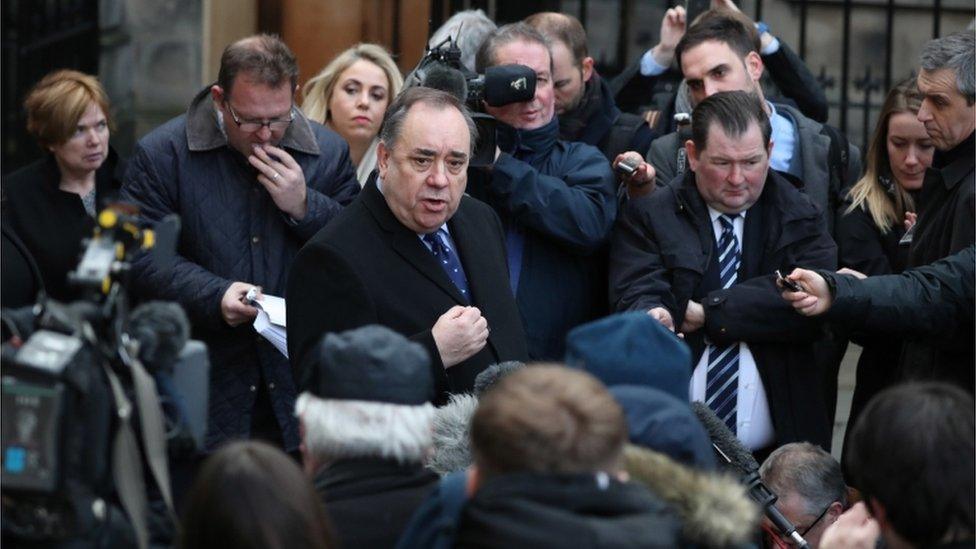
Mr Salmond won a £500,000 expenses payout from the government after it conceded its investigation had been unlawful
Government or party meetings?
Ms Sturgeon has also insisted that she did not intervene in the complaints process - and that she did not meet Mr Salmond in her capacity as first minister, but rather as leader of the SNP.
This matters in the context of the ministerial code because Section 4.22 states that "the basic facts" of government meetings with "external individuals" should be recorded, including a list of those present and the reasons for the meeting.
The 2 April meeting at Ms Sturgeon's home was not formally recorded - she told the inquiry committee, external she had "met a friend of 30 years" as leader of the party, because she "suspected that he may be about to resign from the SNP".
Mr Salmond says this position is "ridiculous", and that "all participants in that meeting were fully aware of what the meeting was about and why it had been arranged". He added: "The first minister's claim that it was ever thought to be about anything other than the complaints made against me is wholly false."
Ms Sturgeon's husband, SNP chief executive Peter Murrell, suggested in his evidence that the situation might not be quite so clear cut.
He says Ms Sturgeon never discussed the complaints with him because they were government business. But his view was that Ms Sturgeon could have initially agreed the meetings thinking they were a party matter, before subsequently realising they were "something else".
However, this does not settle the fact there were two further meetings between the pair - another in Glasgow and one in Aberdeen - which again were not formally recorded.
Ms Sturgeon's response to this is that she was "trying to protect the confidentiality and integrity" of the complaints process.
She says this section of the code is designed to "prevent a minister having meetings about decisions that they are taking in government and not declaring them", but says "that was a decision I was not involved in".
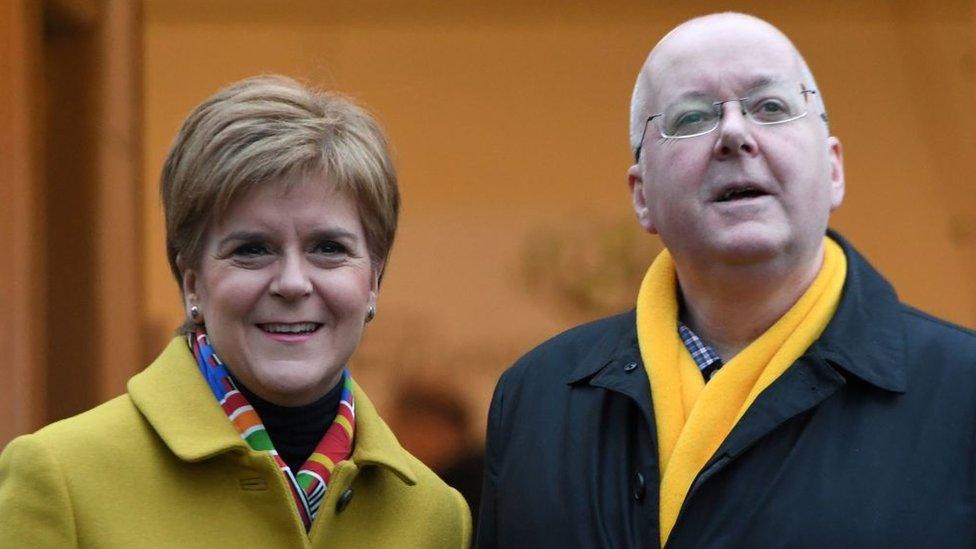
Peter Murrell said Nicola Sturgeon would not discuss government business with him
Following legal advice?
Yet another row concerns whether the government followed its own legal advice while contesting the judicial review case raised by Mr Salmond.
The former first minister insists that counsel had informed the government before the end of October 2018 that they were staring defeat in the face, but that the case ultimately continued into the following January at the cost of hundreds of thousands of pounds.
Mr Salmond says this is contrary to Section 2.30 of the code, which sets out the "overarching duty on ministers to comply with the law" and to "ensure their decisions are informed by appropriate analysis of the legal considerations".
The Scottish government meanwhile says it was only much later that it became clear the case was doomed, with Permanent Secretary Leslie Evans being given explicit advice, external that "the only sensible and defensible action is to concede the petition" on 29 December.
The ins and outs of this may be harder to judge than the matter of the meetings, because much of the government's legal advice remains shrouded in secrecy.
MSPs have twice voted to demand legal privilege be waived so that advice can be published in full. But the government argues that to do so would undermine the whole system of free and fair legal advice, and prevent lawyers from providing frank opinions in future.
The Holyrood inquiry committee has been given some access to reports summarising the advice, but are still calling for more.
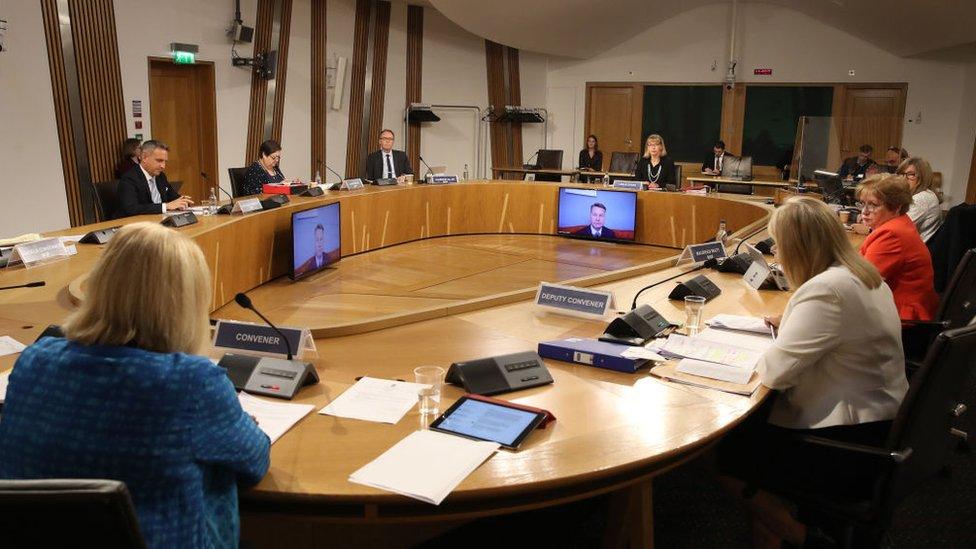
The Holyrood inquiry is separate to the code investigation, but has been tracking its progress
What might happen?
The inquiry committee might come up with a view of Ms Sturgeon's conduct, but the one that really matters is that of James Hamilton.
A former head of the prosecution service in Ireland, Mr Hamilton was appointed to the ministerial standards panel in 2013. He will pen a report setting out whether or not in his judgement Ms Sturgeon breached the rules.
However, as an external advisor, he would not have any power to impose a punishment - that power lies with the first minister herself, as the ultimate arbiter of the code.
If he says there was no breach, Ms Sturgeon will move on unscathed. But what will happen if he returns a judgement saying the first minister broke the code?
It could be argued that Mr Salmond's goal is to remove Ms Sturgeon from office given he has called for the code inquiry to be expanded and highlighted a string of alleged infractions which the code itself suggests could prompt a resignation.
Whether this would actually be the outcome of a breach is far less clear.
Ms Sturgeon is at the peak of her popularity, is currently leading Scotland through a pandemic, and will be facing the judgement of the voters in a few months' time anyway.
The defences she has offered so far also point to where mitigation of any breach could be offered - she could argue that it was right to focus on protecting the anonymity of the complainers, rather than minor matters like making sure meetings were minuted.
On the one hand, the history of Holyrood is littered with leaders who fell from the top over relatively technical matters - Henry McLeish for sub-letting his constituency office, external, David McLetchie over taxi fares, external and Wendy Alexander over registering donations, external.
But equally, there is a more up-to-date example of a minister being found to have breached a ministerial code and remaining in office, in Home Secretary Priti Patel.
Few things about this inquiry have been clear-cut or straightforward, and the outcome may well turn out to be every bit as muddy as the process has been.
Related topics
- Published8 January 2021
